- Home
- Brian Keene
The Conqueror Worms Page 9
The Conqueror Worms Read online
Page 9
“K-Kevin,” he hissed. “S-Sarah? G-got t-t-to get…it’s in… in the water. Th-the Kraken!”
“What’s he saying?” Carl asked me.
“He’s in shock,” I said. “Get your belt around his leg, or he’s gonna bleed to death right here in the field.”
Someone else cried out from the other half of the wreckage. I noticed a petite, bloodstained hand adorned with long, peach-colored fingernails. I stared at them in fascination, marveling that only one nail had broken.
I realized that I was going into shock myself, and I jumped when Carl called out to me.
“Get them out of there, Teddy.” Now he was okay and I was the one starting to lose it.
I shoved a piece of steel out of the way and clambered over the frame to where the hand was. I cleared the wreckage and found it was attached to a pretty young woman with long blond hair, sprawled beside a bloodied young man. Both of them were probably in their mid to late twenties, and they seemed unharmed, except for deep cuts in his forehead and shoulder, and the woman’s broken nail.
They both blinked at me with big, round, horrified eyes.
“Howdy.” I tried to smile.
“We—Are we alive?” the man asked, bewildered.
“You are, indeed,” I said. “Must be lucky, I guess. Are you hurt?”
“Th-there was a man,” the woman stammered.
“Some son of a bitch was shooting at us,” the man said, then noticed Earl’s rifle in my hands. “You! It was you!”
The woman whimpered, throwing her hands up in front of her face.
“Now hang on there,” I said softly. “Just hang on a minute. It wasn’t me. The fellow that was shooting at you is my neighbor, Earl Harper. He’s a crazy cuss, and I apologize for that. But the important thing now is to get you folks out of this weather and into safety. Are either of you hurt?”
The young man shook his head. “I don’t think so.”
“My head hurts,” the girl complained. “But I’m okay.”
I gave them both a cursory check, and looked at her pupils for signs of a concussion, but they both seemed all right. When I turned to check on Carl, I caught a hint of movement out of the corner of my eye. It was just at the edge of the forest, where the field grass met pine trees and the gray light met darkness.
Carl didn’t seem to notice.
“What are we going to do about this one, Teddy?” he asked.
The man on the ground grabbed Carl’s shoulder. Carl jumped in alarm.
“I c-can’t f-feel my l-legs,” the older man gasped. “What’s ha-happened? I can’t f-feel my damn legs.”
“Salty,” the woman cried out. “Are you okay?”
“S-Sarah,” the old man answered. “Is that you, girl?”
I was surprised that he was still conscious. He’d been gushing blood, going into shock, and having a seizure, yet despite this, he remained awake. Hardy stock, I guess. That’s why they call us the greatest generation.
The young man and woman climbed out of the wreckage and I helped them hobble over to Carl and their friend.
When the woman, Sarah, saw the bone poking through his torn flesh, she screamed, burying her face in the young man’s chest. The one on the ground, Salty, looked at her in puzzlement, and then glanced down at his leg. When he saw what had happened, he began to scream, too.
“My leg! The damn bone’s come out!”
I motioned to the younger man. “What’s your name, son?”
He eyed the rifle suspiciously and then met my stare.
“Kevin. Kevin Jensen, out of Baltimore.”
He sounded tired—and old. Were I to have guessed, I’d say he felt as old as me. I wondered what he’d seen in the past few weeks (other than this helicopter crash) to make him sound that way.
“Nice to meet you, Kevin. Let’s start over, okay? My name is Teddy Garnett, and my friend over there is Carl Seaton. We’re the Punkin’ Center, West Virginia, welcoming committee. We don’t mean you any harm. You folks have been shaken up, that’s for sure, but we’re here to help you.”
Salty’s screams of pain had turned to whimpers again. He was fading in and out of consciousness.
“Somebody shot at us,” Sarah said. Her expression was one of disbelief.
“Like I said, that was my neighbor, Earl Harper. I’m real sorry about that. He figured you folks were the United Nations occupying force or some such nonsense. Earl wasn’t wrapped real tight before any of this happened”—I waved my hand at the sky above us—“and I’m sure it hasn’t helped his mind at all. In fact, the weather probably made him worse.”
Kevin glanced around in a daze. “Where’s Cornwell?”
“Who?” I asked.
“Cornwell. Our pilot. Did he survive?”
“I’m afraid not.”
I glanced at the wreckage of the cockpit and Kevin started toward it, but Carl pulled him back.
“You don’t want to see that, son.”
I stared at the ground as Sarah began to sob, her tears indistinguishable from the raindrops on her cheeks.
Carl broke the silence. “Let’s get—”
Something cracked in the woods—loud, like another gunshot. I think we all jumped, and Kevin screamed. The noise was followed by the sounds of wood snapping and splintering as a tree crashed to the ground. The echoes rang through the air. I thought about my apple tree and how it was slowly being uprooted. Then I thought about the strange holes we’d found.
“Look.” I grabbed Kevin’s arm. “We need to make sure Earl can’t cause us any more trouble, and then we need to get your friend…” I snapped my fingers, trying to remember his name.
“Salty,” Sarah said. “His name is Salty.”
“Salty,” I nodded. “We need to get him inside and check you folks over. You’re probably in shock right now. Carl and I are going to go take care of Earl and fix up something to safely move Salty with. Carl’s stopped the blood flow, but if we don’t sew him up soon he’ll be dead for sure. You folks stay here with him until we get back. Make sure that belt around his leg stays tight.”
More snapping and popping came from the forest. That’s when I really started to get scared.
“What’s that in the woods?” Sarah asked.
“Probably just some deer,” I assured her, “scared from the crash and all the shooting.”
Carl gave me an odd look but said nothing.
I handed Earl’s rifle to Kevin. “You know how to use this?”
His face darkened for a moment and he got a strange look in his eyes. “I had a crash course on guns not too long ago.”
“Good. Take this one.”
I think he saw in my eyes that something was wrong, because he said, “You’ve seen them, haven’t you?”
“Seen what, son?”
“The things from below. You’ve got them here on dry land too, don’t you?”
“I’m not sure what you’re talking about, Kevin, but yeah—I think I heard something out there. We all did. Don’t know what it is, but I don’t like the sound of it.”
He glanced back at the tree line and then, without a word, escorted Sarah over to Salty.
I checked the injured man’s makeshift tourniquet, and then Carl and I waded toward the shed.
“Teddy, do you really think we ought to be moving that old fellow? He’s hurt pretty bad.”
“Actually, I don’t.” I answered him in short gasps, winded from the last few minutes of exertion. “But I don’t see how we’ve got a choice. If we move him, there’s a chance we may hurt him even worse than he is now. I don’t reckon there are any doctors around these parts to treat him, and I’m not sure what we can do, other than sew him up with a needle and thread. But if we leave him out here, he’s going to die for certain of pneumonia.”
“So what do we do? What’s the plan?”
“Well, I reckon we’ll get some duct tape from the shed and some kindling from the woodpile and make a splint. Then we’ll get the wheelbarrow and ha
ul him right up to the house, after we pop that bone back into place.”
Carl looked queasy at the prospect of setting the splintered bone. “You know how to do that?”
“Not really.”
“But we’re gonna try anyway?”
I sighed. “Let’s be honest here. No matter what we do, this Salty fellow is probably going to die. He’s lost a lot of blood, and even if we do manage to reset the bone and sew his leg up, we don’t have anything here to fight the infection. He could get gangrene. But we still have to try.”
“We could amputate,” Carl suggested. “Cut it off and cauterize the wound, like they do on television.”
“Do you honestly think you could do that, Carl?”
“No. I don’t reckon I could.”
“Me neither.”
“What about Earl?” he asked. “He ain’t going to be happy when he finally wakes up. I knocked him a good one. Not to mention we helped these folks from the United Nations.”
I stopped in my tracks. “Carl, do you really think those poor people back there are U.N. invasion troops? For God’s sake, the helicopter wasn’t even black.”
Carl’s wet ears turned red. “No, I guess not.”
“Let’s just lock Earl up in the shed, till we figure out what to do with him.”
“He ain’t gonna be happy about that, either. He’s liable to be madder than a porcupine in a pickle barrel.”
I smiled. “At least he’ll be dry.”
Earl lay where we’d left him, unmoving. He’d thrown up muddy water all over himself. I checked his pulse and felt it beating beneath his cold, wet, liverspotted skin. Carl grabbed his legs and I tugged his arms, and we dragged him through the mud to the shed door. As we did so, I noticed the hole next to the woodpile that we’d discovered the day before had caved in. All that was left was a big depression in the earth.
Carl fumbled with the rusty top latch on the door. It clicked open, and he bent to undo the bottom one. Suddenly, I recalled the muffled noise I’d heard yesterday, from inside the shed, when Carl and I were messing with the drum of kerosene.
“Carl, maybe we’d better—”
The wind ripped the door from Carl’s grip before I could finish. The door slammed back and forth on its hinges, allowing us to see inside.
The shed stood empty. Well, not empty, mind you. Just not what I’d imagined might be in there. My riding mower and seeder and wheelbarrow, and my drum full of shelled corn for the deer and squirrel feeders, and my fishing equipment, garden tools, shovels, picks, hoes, and axes, and my workbench…but nothing else. Nothing that could dig a tunnel beneath the ground. The oak plank floor was empty of monster worms or giant groundhogs.
We hefted Earl inside.
I noticed that strange smell again; wet, earthy—like codfish oil. I wondered if the whole world was beginning to smell like that. Grunting with effort, I let go of Earl’s legs and his boots thudded on the floor.
My breathing came in short, winded gasps. I wanted a dip. My body cried out for one. That old television slogan, from the commercial with Charlie Daniels, ran through my mind. Just a pinch between the cheek and gum…
There was a roll of duct tape on the workbench. I tossed it to Carl, and he began binding Earl’s wrists behind his back. I grabbed some bailing twine and went to work on his feet.
“Boy,” Carl whispered, “I sure do hope he don’t wake up yet.”
“He’s not going to. You must have really knocked him a good one.”
Carl tore off a length of gray duct tape. “I reckon so. Been wanting to for the better part of two decades. He had it coming ever since that time he shot at my dog when she was running rabbits out behind his place. I should have kicked his butt back then and saved us all some trouble.”
Earl’s chest rose and fell. His breathing was quiet and shallow.
“We’ll want to be careful not to jab that piece of bone sticking out of Salty’s leg,” I said as I unknotted the bundle of bailing twine. “We’ll pad the splint with some of those shop rags over there.”
Carl nodded and finished binding Earl’s wrists.
That was when the floor moved. It wasn’t sudden. There was no explosion or jolt. But the wooden planks we were kneeling on slowly began to rise, almost unnoticeably at first. Three inches. Then six. Then back down. Then up again, like the floor was breathing. We froze. There was no sound, save the creaking wood and our own terrified heartbeats, throbbing in our ears.
Carl stared at me with wide eyes, and I stared back at him, probably looking the same.
Then there was a wet sort of rustling; a rubbery sound, like what crinkling paper might sound like under water. I reckon rubbery doesn’t go with crinkly, but I don’t know how to describe it any better than that. Maybe it shouldn’t be described. Maybe it shouldn’t be at all. Like I said earlier, I’m not a writer. All I know is I’d never heard a sound like that in my entire life and it was the most unpleasant thing I’ve ever experienced. Combined with the rolling motion of the floor, which had begun to resemble the deck of a ship at sea, and that same fishy smell that had come creeping back, I suddenly grew nauseous.
It must have shown on my face, because Carl’s expression changed from alarm to concern. I opened my mouth to speak, and then I threw up my breakfast all over Earl’s chest and stomach. Gagging, Carl turned away.
The floor continued to move. Somewhere in the corner, the planks began to snap. Carl shouted something, but the dizziness had my ears ringing, and I couldn’t understand him.
Nausea is never pleasant, and let me tell you, it doesn’t get any easier after you pass eighty. I couldn’t do anything except lie there, hands clutching the pitching and groaning boards, while my own body betrayed me. That fishy stench was overpowering now, and I think I must have passed out for a brief second.
The next thing I knew, Carl was screaming. I looked up and stared into a nightmare. Then I started screaming, too.
Carl had grabbed my twelve-inch lock-blade hunting knife from the workbench, and he was on the floor, stabbing the knife down again and again between the cracks in the planks. Something jerked beneath the boards as the blade disappeared through the cracks again. I only saw it for a second, but what I saw made me lose control of my bladder.
It looked like a quivering lump of grayish-white jelly, buried beneath the floorboards. The blade sank into the rubbery mass like it was margarine. Brownish ichor spilled from the wound, gushing up from between the cracks in the floor. The boards heaved again, splintering, and then were still.
The thing hadn’t made a sound the entire time, not even when Carl stabbed it.
He turned to me. His face was pale and covered with sweat. “Let’s get the hell out of here, Teddy!”
“What was that thing?” I stammered, still weak from my dizzy spell.
“I don’t know. Oh Lord, I don’t know. Let’s just go! Please? Let’s just lock Earl inside the shed and leave.”
I stumbled to my feet and grabbed the rags and the duct tape. Carl kept the knife. We left Earl lying on the floor and dashed back out into the yard. The wind rocked the shed door back and forth, and I fumbled to shut it. Then I realized we’d forgotten the wheelbarrow to haul Salty in.
Carl disappeared around the corner.
“Wait for me,” I called out. “Carl!”
Then he screamed again.
Out of breath and panicking, I ran around the side of the building and slid to a halt. The thing that had been underneath the shed was definitely not an oversized groundhog. It had crawled back outside, reopening the tunnel beside the woodpile. Half of it jutted from the hole, thrashing in pain. Stinking fluid sprayed from the knife wounds in its side.
I couldn’t believe my eyes.
It was a worm. A giant earthworm, the size of a big dog, like a German shepherd or a Saint Bernard, but much longer. It undulated back and forth in the mud and grass, covering the ground with slime. Watery, brown blood pulsed from the gash in its hide.
More
of its length pushed out of the hole and the creature whipped towards me like an out of control fire hose. The worm’s tip (what I guess must have been its head, though I couldn’t see any eyes) hung in the air in front of me, only an arm’s reach away. Then the flesh split, revealing a toothless maw. It convulsed again, and then that horrible, yawning mouth shot towards me. Shrieking, I stumbled backward to the shed door. The worm followed.
Now, as it chased after me, the worm finally made a sound. It wasn’t a cry or a scream or a roar or even a grunt. In fact, as far as I could tell, it wasn’t composed from vocal chords at all.
A high-pitched blast of air rushed from its gaping mouth, a vibrating noise that sounded like—well, to be honest, it sounded like somebody pretending to fart. You know that sound you make when you put your mouth against your arm and blow? That’s the same noise the creature was making. We used to call that a raspberry.
But it wasn’t funny. It was the most terrifying thing I’ve ever heard. And it sounded angry.
The worm heaved its bulk forward and emerged all the way from the hole. I jumped back inside the shed, slipped in the worm’s blood, and fell. My teeth clacked together on my tongue, and pain shot up my spine. The worm crawled after me, dripping slime and more of that brown blood in its wake. Outside, I heard Carl shouting for help. I crab-walked backwards, scuttling along the wooden planks. Dozens of splinters punctured my hands and my fingers slipped through a pool of my own warm vomit.
The monster snuffled doglike along the floor, as if smelling me out, but I didn’t see any kind of nose or other organs—just that slathering mouth. Maybe it could sense my movements—my vibrations. It occurred to me that while I may have been the smartest man in Punkin’ Center, I sure didn’t know much about worms other than that birds and fish liked to eat them and that your dog might contract them if you didn’t take care of him.
I backed myself into the corner, directly across from Earl, who was still sprawled unconscious on the floor while the world ended around him. More of my vomit was drying on his clothes.

 The Rising
The Rising Entombed
Entombed Take the Long Way Home
Take the Long Way Home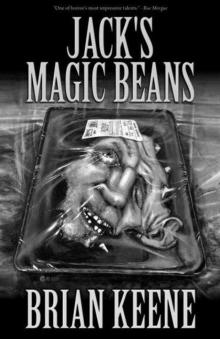 Jacks Magic Beans
Jacks Magic Beans Ghost Walk
Ghost Walk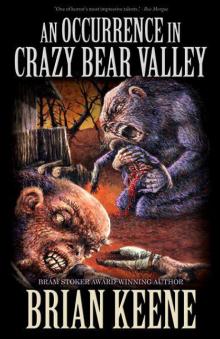 An Occurrence in Crazy Bear Valley
An Occurrence in Crazy Bear Valley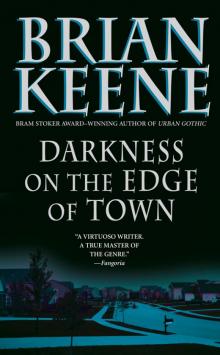 Darkness on the Edge of Town
Darkness on the Edge of Town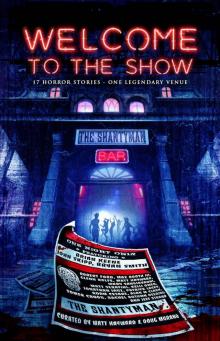 Welcome to the Show: 17 Horror Stories – One Legendary Venue
Welcome to the Show: 17 Horror Stories – One Legendary Venue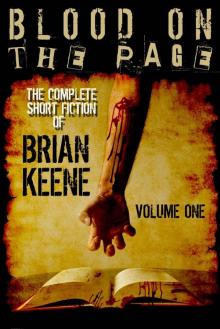 Blood on the Page: The Complete Short Fiction of Brian Keene, Volume 1
Blood on the Page: The Complete Short Fiction of Brian Keene, Volume 1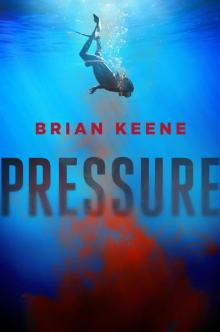 Pressure
Pressure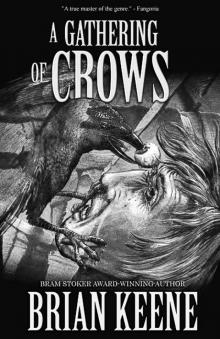 A Gathering of Crows
A Gathering of Crows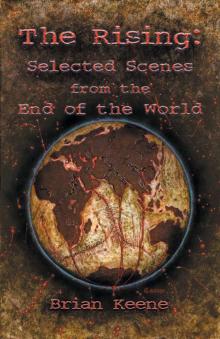 The Rising: Selected Scenes From the End of the World
The Rising: Selected Scenes From the End of the World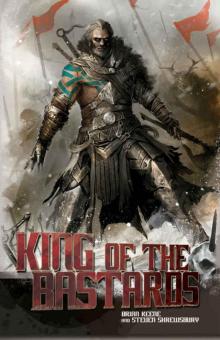 King of the Bastards
King of the Bastards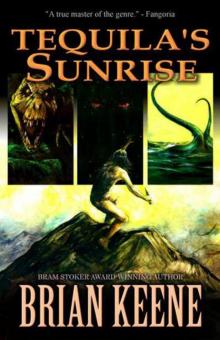 Tequila's Sunrise
Tequila's Sunrise All Dark, All the Time
All Dark, All the Time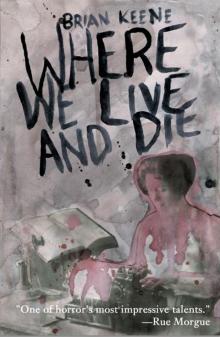 Where We Live and Die
Where We Live and Die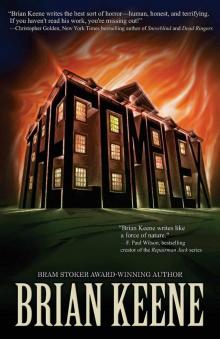 The Complex
The Complex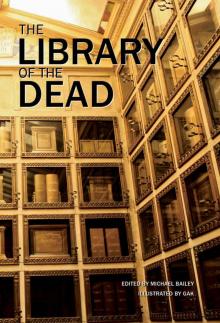 The Library of the Dead
The Library of the Dead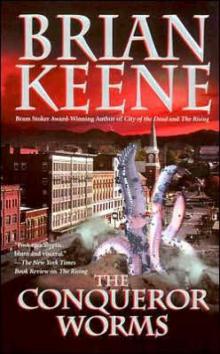 The Conqueror Worms
The Conqueror Worms The Girl on the Glider
The Girl on the Glider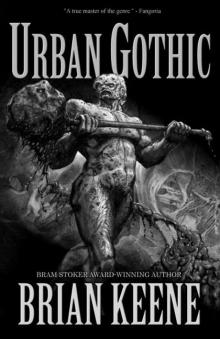 Urban Gothic
Urban Gothic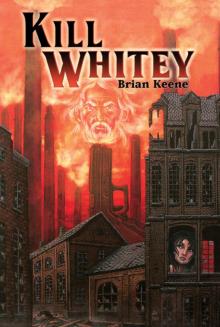 Kill Whitey
Kill Whitey Terminal
Terminal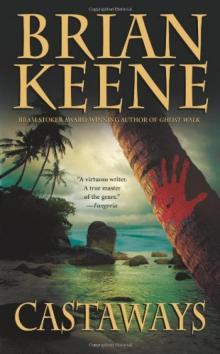 Castaways
Castaways